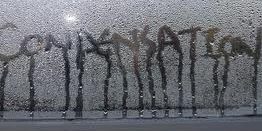- Treat any existing mould in your home before taking steps to reduce condensation. You need to restrict new mould growth first before you install insulation as otherwise your mould problem could get worse.
- Install ceiling insulation to end simple cases of condensation dampness on ceilings and the top parts of external walls. This stops both the ceiling and the tops of walls from getting too cold and brings with it a significant saving in the amount of fuel needed to heat the house in winter.
- When redecorating your home, be aware that mould regrows through paint or paper so there is no use just decorating over the top of it. Instead use a salt neutraliser on the wall plaster and then brush on an anti-mould paint. Mould loves to grow in the lining of wallpapers but if you really want to wallpaper your home, you can use an anti-mould wallpaper paste to remedy this.
- Consider putting heavy drapes with pelmets over windows as they create an insulating layer of air, which prevents condensation forming on the cold glass surface. Installing trickle vents in windows is another option that may help.
- Have thermostatically controlled heating wherever possible.
- Open windows and cut back shrubbery when the external air is drier. This will increase airflow through the house, which will reduce humidity.
- Externally vent all water-vapour producing appliances like washing machines, clothes dryers, showers and stoves. Venting into the roofspace can cause condensation problems, particularly when the house has a metal roof.
- Ensure all cooking, bathing and clothes appliances have enough air circulating around them.
- Install extractor fans in the kitchen, bathroom and laundry.
- Cover pans when cooking and let steam escape by opening a window or using an extractor fan for up to 20 minutes after you have finished cooking or washing.
- Dry clothes outdoors whenever possible or use well-ventilated rooms.
- Make sure air vents are not blocked. Keep furniture further away from the walls to improve air flow in the room. Don’t fill cupboards to bursting point.
- Close kitchen and bathroom doors to prevent steam travelling into colder rooms.
- Wipe surfaces when moisture settles to stop mould forming.
- Cover fish tanks or think about ways to reduce any moisture caused by household pets and plants.
Houspect: Buy, Build and Invest with Confidence
08 9240 8855
info.wa@houspect.com.au







